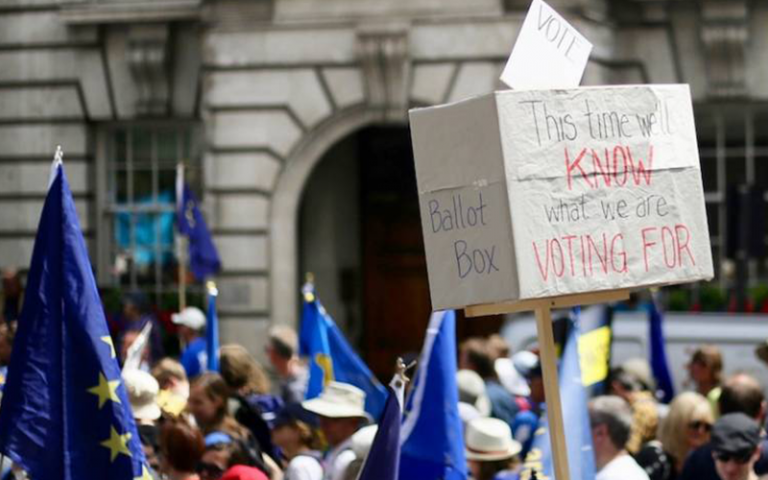UCL academics shaping the legal framework for Brexit
Professors from the UCL Faculty of Law shape the legal framework for Brexit, supporting legal advocacy and informing landmark UK and EU judicial decision-making on fundamental constitutional norms.

28 April 2022
The first stage in implementing the outcome of the UK’s 2016 referendum on membership of the European Union involved triggering Article 50 of the Treaty on European Union, which allows an EU member state to notify the European Council of its intent to leave the union.
However, prior to the referendum, there had been little legal analysis of Article 50, and almost none on its relationship to UK constitutional requirements. This, together with the unwritten nature of the UK’s constitution, meant the referendum outcome presented immediate questions about the UK’s parliamentary democracy in relation to EU constitutional law.
This led UCL Laws Professors Piet Eeckhout, Jeff King and Tom Hickman to examine EU and UK institutional law to clarify the process by which the UK could trigger Article 50 and the possibility of revoking that notification later.
The blog post that made it to the Supreme Court
Three days after the referendum result, Professors King and Hickman, together with a colleague from Oxford University, published a blog post arguing that an Act of Parliament would be necessary to trigger Article 50, respecting the UK’s constitutional requirements as well as EU values. The blog post received significant attention and had been viewed some 220,000 times by January 2017. It also featured prominently in parliamentary committee proceedings of the House of Lords Select Committee on the Constitution.
Arguments set out in the blog became central to submissions made in the UK Supreme Court by Gina Miller’s legal team in the ground-breaking Miller I judgment. Based on arguments set out in the blog, on 24 January 2017, the Supreme Court ruled that the UK Government could not initiate withdrawal from the EU without an Act of Parliament. This ruling gave MPs an opportunity to shape the Brexit process, creating new avenues for legislative engagement on the timing and terms of Brexit.
The revocability of Article 50
In parallel, Professor Eeckhout was exploring whether an Article 50 declaration, once made, could be revoked unilaterally by the UK, without the agreement of other EU Member States. The assumption had been that the notification was not unilaterally revocable in this way, but Eeckhout’s constitutionalist reading of Article 50 (in a paper with a colleague from Durham) offered hope for those anticipating a potential change of heart in the UK’s decision to leave.
The revocability issue was taken up by a cross-party group of MSPs and referred to the Court of Justice of the European Union where Professor Eeckhout served as an academic advisor. On 10 December 2018, the European Union Court of Justice adopted Eekhout’s reading of Article 50, ultimately determining that a member state could unilaterally revoke a decision during the two-year negotiation period.
Protecting Parliament’s role
This gave MPs legal confirmation that a deeply divisive debate about the political future of the UK was not foreclosed by then Prime Minister May’s agreement: the choices were not simply May’s proposed Brexit agreement with the EU, or no agreement and the option to remain subsisted.
Together, these two decisions safeguarded Parliament’s role in what has proved a fundamentally important, and deeply controversial, phase in Britain’s political history.
Professor Eeckhout has said: “Research and engagement from UCL Laws shaped the legal framework for Brexit and safeguarded Parliament’s role in what has proved a fundamentally important, and deeply controversial, phase in Britain’s political history.”
Research synopsis
Shaping the legal framework for Brexit
A team at UCL Laws helped shape the legal framework for Brexit, supporting legal advocacy and informing landmark UK and EU judicial decision-making on fundamental constitutional norms. Through two landmark cases, their work ensured an Act of Parliament was needed to initiate withdrawal from the EU and established that a notification of EU withdrawal, once made, could be unilaterally revoked by the UK.
Links
- Prof Piet Eeckhout - Iris Profile
- Prof Jeff King - Iris Profile
- Prof Tom Hickman - Iris Profile
- UCL Faculty of Laws
- Faculty of Law - REF 2021
Image
- Image credit: UCL - The Constitution Unit News
 Close
Close

